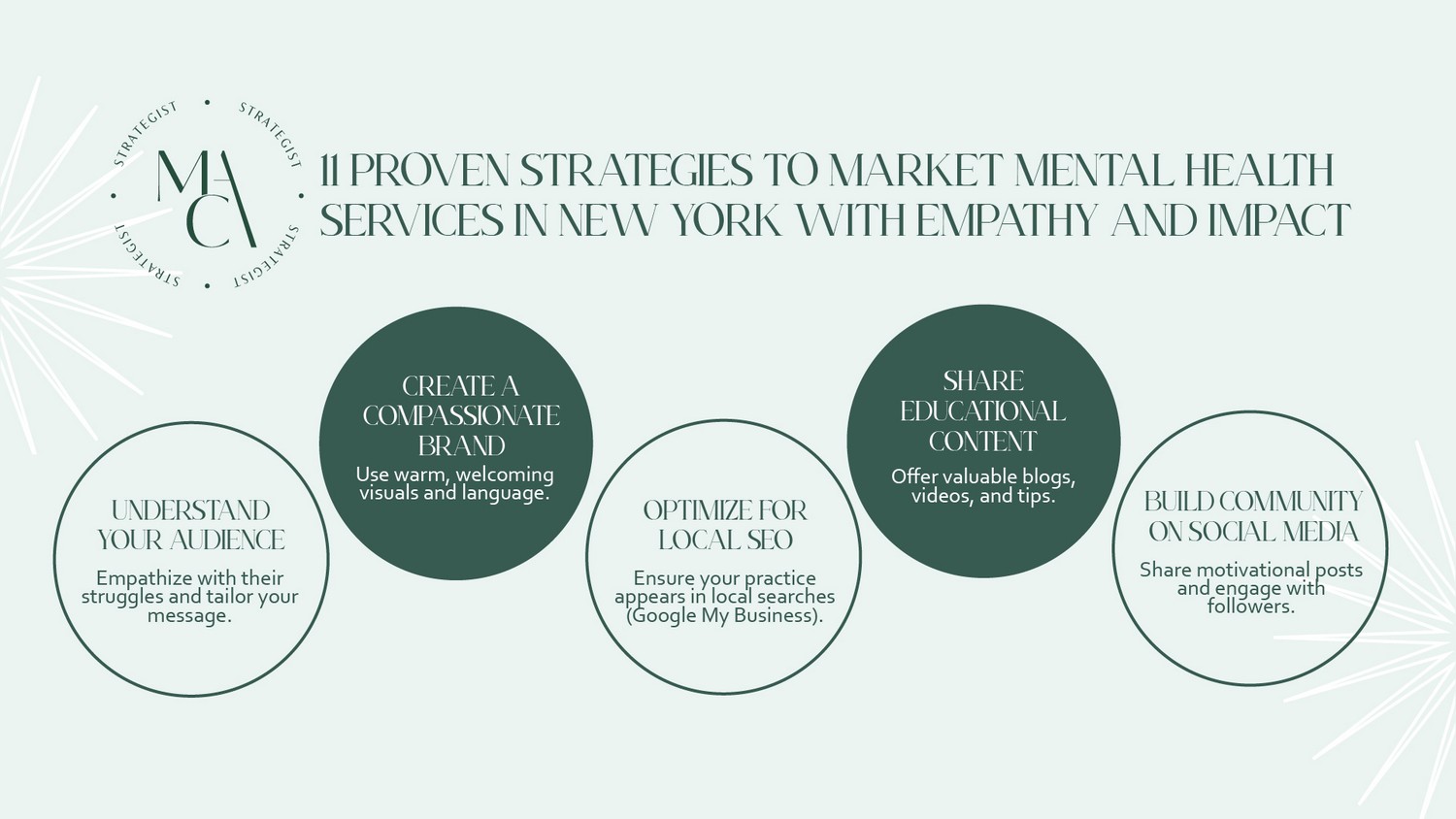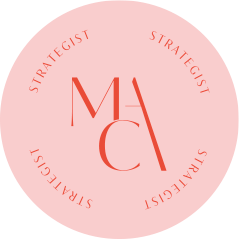Mental health is an essential part of overall wellness, and for providers in New York, reaching those in need requires thoughtful and empathetic marketing strategies. With more people seeking support for mental well-being, mental health professionals have the opportunity to connect with their communities in meaningful ways.
Marketing mental health services in New York isn’t about aggressive advertising—it’s about creating trust, fostering relationships, and demonstrating genuine care. Whether you’re a private practitioner, a mental health clinic, or a digital wellness agency, the strategies below can help you stand out and make a difference.
1. Understand Your Audience’s Needs
Mental health services are deeply personal, and the journey to finding support is often filled with hesitation, questions, and emotion. That’s why understanding your audience is more than just a marketing strategy—it’s about truly empathizing with the challenges they face and the help they seek. A one-size-fits-all approach doesn’t work in mental health; each group has unique struggles, concerns, and aspirations.
Are you focusing on:
- Adults dealing with anxiety in a high-stress job market?
- Teenagers navigating stress and identity in a fast-paced, social media-driven world?
- Families coping with communication breakdowns or trauma?
By narrowing your audience, you can create messaging that speaks directly to their emotions and provides a sense of hope and understanding. For example, adults dealing with work-related anxiety may respond well to messages emphasizing stress management techniques, while parents looking for family counseling may connect with content about improving communication and restoring harmony at home.
How to Learn About Your Audience:
- Surveys: Ask open-ended questions that allow potential clients to share their struggles in their own words. For example, “What is the biggest challenge you’re currently facing with your mental health?”
- Interviews: Host small focus groups or one-on-one discussions to dive deeper into their concerns. These conversations will give you insight into their pain points and how they feel about seeking mental health support.
- Online Communities: Explore forums like Reddit (e.g., r/mentalhealth or r/anxiety) and social media groups where people openly discuss their challenges. These platforms are a goldmine for understanding real, unfiltered client concerns.
- Google Trends: Use this tool to identify the mental health-related topics trending in New York. Search terms like “therapy near me” or “coping with stress in NYC” can provide valuable insight into what potential clients are looking for.
Key Tip:
The more you understand your audience’s world, the more your messaging can act as a lifeline. Speak to their emotions, validate their struggles, and show them that your services are tailored to meet their unique needs.
2. Develop a Compassionate Brand
When it comes to mental health services, your brand is more than a logo or a tagline—it’s a promise of safety, understanding, and care. Clients seeking mental health support often feel vulnerable, and your brand needs to make them feel seen and valued from the very first interaction.
Why Compassionate Branding Matters:
Imagine a potential client browsing your website. What do they see? A cluttered homepage with clinical jargon and impersonal photos? Or a clean, welcoming space with soothing colors, relatable imagery, and warm, encouraging language? Your branding sets the tone for the client’s entire experience with your practice.
Building a Brand That Resonates:
- Visual Identity:
Choose colors that evoke calm and trust, such as soft blues, greens, or neutral earth tones. These shades create an inviting atmosphere, helping clients feel at ease even before they contact you. Learn more about color psychology from Canva.
Use clean, uncluttered design elements that reflect simplicity and transparency. Avoid overly clinical visuals that may feel cold or unapproachable. - Tone of Voice:
Your words should feel like they’re coming from a trusted friend or mentor. Use warm, empathetic language that acknowledges their struggles while emphasizing hope and possibility. For example:- Instead of: “Our clinic provides psychotherapy and CBT services.”
- Try: “We’re here to help you navigate life’s challenges and find your path to healing.”
- Real Testimonials:
Share success stories from clients (with permission) to humanize your services and show potential clients that they’re not alone. A testimonial like, “Thanks to [Your Practice], I finally feel like I have the tools to manage my anxiety and live a fuller life,” can be incredibly powerful. - Mission Statement:
Your mission statement should clearly articulate your purpose. For example:
“Our mission is to provide compassionate, accessible mental health support to individuals and families in New York, empowering them to lead healthier, more balanced lives.”
Pro Tip:
For more tips on creating a compassionate and relatable brand, visit our resource on Digital agency for wellness brands NY.

3. Leverage Local SEO to Attract Nearby Clients
In a sprawling state like New York, where millions of people search online for mental health support, local SEO isn’t just helpful—it’s essential. When potential clients type “mental health services near me” or “therapy in New York” into Google, your practice needs to appear front and center. Effective local SEO strategies can ensure that your services are visible to those who need them most.
Steps to Optimize for Local SEO:
- Google My Business:
Create or update your Google My Business profile. Make sure all the information is accurate, including:- Your business name, address, and phone number (NAP)
- Business hours, including holiday availability
- A description of your services, such as “individual therapy for anxiety,” or “family counseling in New York.”
- Photos of your office to give potential clients a sense of your space.
- Encourage satisfied clients to leave positive reviews. Google favors businesses with strong, recent reviews.
- Use Location-Specific Keywords:
Integrate terms like “Marketing Mental Health New York” or “therapy near me” into key areas of your website:- Meta descriptions and page titles
- Blog content and headings
- Alt text for images (e.g., “Mental health counseling in New York City”)
- Create Locally Relevant Content:
Write blog posts that tie your services to New York-specific events or resources. For instance:- “Top 5 Stress-Relief Activities in Central Park”
- “How to Find Affordable Mental Health Services in NYC”
- “What New Yorkers Should Know About Family Therapy”
- Leverage Backlinks:
Collaborate with local organizations, nonprofits, and wellness providers to get your website linked on their pages. This not only boosts your SEO but also builds credibility.
Key Tip:
Local SEO is an ongoing process. Monitor your rankings and analytics regularly to ensure your efforts are driving traffic and inquiries.
4. Create Valuable, Educational Content
In the world of mental health, content isn’t just about marketing—it’s about creating resources that provide value and guidance for people in need. Educational content builds trust, positions you as an authority in your field, and can be a lifeline for someone searching for answers. The right content can empower potential clients to take the first step toward seeking help, knowing they’ve found a resource that understands their challenges.
Why Educational Content Matters:
Imagine someone in New York feeling overwhelmed by anxiety. They search online for tips to manage their feelings. They land on your blog post, “How to Cope with Anxiety in a Fast-Paced City Like New York,” and find practical advice written with empathy. That first interaction may be the beginning of a relationship with your practice.
Types of Educational Content to Create:
- Blog Posts: Write relatable and actionable articles on topics like:
- “The Benefits of Family Counseling: Stories from NY Families”
- “Understanding the Signs of Burnout in New York’s Fast-Paced Work Culture”
- “5 Mindfulness Practices to Stay Centered During Your NYC Commute”
- Videos: Short, digestible videos can break down complex topics, like explaining therapy modalities or demonstrating breathing techniques.
- Guides and E-books: Create downloadable resources, such as “A Beginner’s Guide to Therapy in New York” or “10 Techniques to Overcome Social Anxiety.”
- FAQs: A well-structured FAQ page on your website can address common concerns like, “How do I know if therapy is right for me?” or “What should I expect during my first counseling session?”
Tips for Making Content Relatable and Impactful:
- Use conversational language that’s easy to understand.
- Share real-life examples or case studies (with anonymity preserved).
- Include practical tips that readers can implement right away.
- Add visuals like infographics or calming images to make the content more engaging.
For more inspiration, explore our insights on Holistic wellness marketing NY.
5. Use Social Media to Build Community
Social media is more than just a marketing tool for mental health professionals—it’s a platform to create a safe, supportive space for people to learn, connect, and feel seen. When used thoughtfully, social media can help destigmatize mental health issues and position your practice as a trusted resource.
Why Social Media Matters in Mental Health Marketing:
People often turn to platforms like Instagram or Facebook when they’re seeking inspiration or information. By consistently showing up with empathetic, helpful content, you can create a sense of belonging and encourage people to engage with your practice.
Ways to Use Social Media Effectively:
- Share Inspirational Content: Post motivational quotes or affirmations to encourage positivity. For example:
- “It’s okay to not be okay. Asking for help is a strength, not a weakness.”
- Educate Your Audience: Create short videos explaining therapy options, such as Cognitive Behavioral Therapy (CBT) or family counseling. Break these topics into bite-sized, engaging pieces.
- Host Interactive Q&A Sessions: Go live on Instagram or Facebook to answer common questions about mental health, such as “How do I choose the right therapist?” This builds trust and demonstrates your expertise.
- Share Stories (With Permission): Highlight anonymized success stories to show the real-life impact of your services. For example:
- “After just six sessions, one of our clients shared how they’ve learned to manage their anxiety and feel more confident at work.”
- Link to Resources: Direct followers to your blog posts or landing pages, such as Wellness advertising experts NY, for more in-depth information.
Key Tip:
Engage with your audience by responding to comments and messages. A simple “Thank you for sharing” can go a long way in building meaningful connections.
6. Collaborate With Other Wellness Professionals
New York’s wellness industry is rich with professionals who share your mission of improving lives. By collaborating with yoga instructors, nutritionists, fitness coaches, or even meditation teachers, you can expand your reach and provide more holistic care to your clients. Collaboration not only strengthens your brand but also emphasizes the interconnectedness of mental and physical health.
Benefits of Collaboration:
- Reaching a Broader Audience: Your partners’ clients and followers can become your potential clients.
- Providing a Holistic Approach: Offering services that address both mental and physical health enhances your value as a provider.
- Building Credibility: Partnering with respected wellness professionals boosts your reputation in the community.
Ideas for Collaborative Efforts:
- Workshops and Webinars: Host a joint event, such as “Yoga and Mental Health: A Path to Mindfulness” or “Nourishing Your Mind and Body Through Nutrition and Therapy.”
- Cross-Promotions: Feature each other’s services on social media or websites. For instance, a nutritionist could share a post about how mental health therapy complements a healthy diet.
- Shared Blog Content: Co-write blog posts or guides. For example, “How Meditation and Therapy Work Together for Stress Relief.”
- Affiliate Programs: Offer discounts or incentives for referrals between partners.
Key Tip:
Look for partners whose values align with yours. Authentic collaborations lead to stronger connections and greater impact.
7. Invest in Compassionate Paid Advertising
Paid advertising, when done right, can amplify your reach and ensure that your services are visible to the people who need them most. However, in the realm of mental health, advertising must feel genuine, respectful, and client-centered. Your goal is to inspire trust, not apply pressure.
Why Paid Advertising Works for Mental Health Services: Platforms like Google Ads and Facebook Ads allow you to target specific audiences based on location, interests, and behaviors. This ensures your ads are reaching the right people—those actively searching for mental health support.
Best Practices for Paid Advertising:
- Focus on Empathy:
Write ad copy that speaks to your audience’s struggles and offers hope. For example:- “Feeling overwhelmed? We’re here to help you navigate life’s challenges with personalized care.”
- Highlight Testimonials:
Use client quotes or case studies to show the real-life benefits of your services.- Example: “Our clients say they feel heard, supported, and empowered after just a few sessions.”
- Target Relevant Keywords:
Use search terms like “Wellness Branding NY,” “anxiety therapy near me,” or “family counseling New York” to ensure your ads appear for the right searches. - Use Visuals Wisely:
Choose calming, relatable imagery that conveys warmth and safety. Avoid generic stock photos that feel impersonal.
Key Tip:
Monitor your ad performance regularly. Platforms like Google Ads offer analytics that can help you refine your approach, ensuring your investment delivers meaningful results.
8. Incorporate Storytelling Into Your Marketing
Stories have the power to inspire, connect, and transform. In mental health marketing, storytelling isn’t just a strategy—it’s a way to show potential clients that they’re not alone and that support is within reach. Stories can demystify the therapeutic process, provide hope, and humanize your practice.
Why Storytelling Works:
When people see themselves in the stories you share, they feel a sense of connection. They’re more likely to trust you and take that crucial first step toward seeking help.
How to Use Storytelling in Your Marketing:
- Share Your Practice’s Journey:
Talk about why you became a mental health professional. What inspired you to start your practice? For example:- “After witnessing how therapy transformed the life of a close friend, I knew I wanted to dedicate my career to helping others find their path to healing.”
- Highlight Client Success Stories (With Permission):
Use anonymized stories to show how your services make a difference. For example:- “One client came to us feeling completely overwhelmed by anxiety. Over the course of eight sessions, they gained tools to manage their stress and began to thrive in their personal and professional life.”
- Create Relatable Content:
Write blog posts or social media stories about common challenges. Titles like “From Struggle to Strength: How Mental Health Therapy Transformed My Life in New York” can resonate with readers and offer them hope.
Storytelling Formats to Explore:
- Blog posts
- Video testimonials
- Instagram or Facebook Stories
- Case studies
Key Tip:
Keep your stories authentic and client-centered. Focus on empathy and hope, and avoid overly dramatic or unrealistic portrayals.
9. Highlight Your Credentials and Expertise
When it comes to mental health, trust is everything. Clients want to feel confident that they’re placing their well-being in capable hands. Highlighting your qualifications and expertise on your website and marketing materials reassures potential clients that they’re making the right choice.
How to Showcase Your Expertise:
- Create a “Meet the Team” Page:
Introduce yourself and your team members with detailed bios. Share your qualifications, certifications, and specialties. For example:- “Dr. Jane Doe, Ph.D., is a licensed clinical psychologist specializing in cognitive behavioral therapy (CBT) for anxiety and depression. With over 15 years of experience, she is passionate about helping individuals find clarity and balance in their lives.”
- Include Testimonials About Your Professionalism:
If clients frequently comment on how knowledgeable and compassionate you are, highlight these testimonials. For example:- “I was nervous about starting therapy, but Dr. Doe’s expertise and kindness immediately put me at ease.”
- Showcase Memberships and Affiliations:
If you’re a member of respected organizations like the American Psychological Association (APA) or the National Alliance on Mental Illness (NAMI), display these prominently. - Publish Content That Demonstrates Authority:
Write blog posts or create videos on topics related to your expertise. For instance, if you specialize in family therapy, share articles like “5 Ways to Improve Communication in Your Family.”
Key Tip:
Combine your professional credentials with a personal touch. Use photos, videos, or even fun facts to show your human side.
10. Promote Free Resources and Tools
Offering free resources is a powerful way to demonstrate your expertise while providing immediate value to potential clients. It also helps build trust and encourages people to engage with your practice.
Why Free Resources Work:
When someone downloads your guide, attends your webinar, or uses your mindfulness worksheet, they get a taste of your approach. This not only builds credibility but also positions you as a generous and knowledgeable professional.
Types of Free Resources to Offer:
- E-Books:
Create downloadable guides on topics like:- “10 Ways to Manage Stress in New York City”
- “How to Support a Loved One Struggling with Mental Health”
- Webinars:
Host live or recorded sessions on relevant topics, such as:- “Understanding Anxiety: Causes, Symptoms, and Coping Strategies”
- “An Introduction to Therapy: What to Expect and How to Begin”
- Printable Tools:
Offer worksheets, such as:- A daily mood tracker
- Mindfulness exercises
- Journaling prompts for self-reflection
- Email Courses:
Create a free 7-day email course on a specific topic, like “Overcoming Social Anxiety Step by Step.”
Key Tip:
Make your resources visually appealing and easy to understand. Include your branding (like a logo and colors) to keep your practice top of mind.
Example Call to Action:
“Download Our Free Guide: ‘10 Ways to Manage Stress in New York City’ and start your journey to a calmer, more balanced life today.”
11. Measure and Adapt Your Strategies
Marketing isn’t a one-and-done activity—it’s an ongoing process that requires attention and adaptation. By tracking the performance of your campaigns, you can identify what’s working and refine your approach for even better results.
Why Measurement Matters:
Without tracking, you’re essentially flying blind. Analytics tools can show you which blog posts are driving traffic, which ads are generating clicks, and which strategies are converting leads into clients.
How to Measure Effectively:
- Use Google Analytics:
Track key metrics, such as:- Website traffic
- Page views on blog posts or landing pages
- Bounce rates (how quickly visitors leave your site)
- Conversion rates (how many visitors contact you or sign up for your services)
- Monitor Social Media Metrics:
Platforms like Instagram and Facebook provide insights into:- Engagement (likes, comments, shares)
- Reach (how many people saw your post)
- Follower growth
- Track Ad Performance:
If you’re running Google Ads or social media ads, review metrics like click-through rates (CTR) and cost per conversion to see how well your campaigns are performing. - Gather Feedback:
Ask new clients how they found you. Their answers can provide valuable insights into which channels are most effective.
Adapting Your Strategies:
If a blog post is driving significant traffic, create more content on similar topics. If an ad campaign isn’t performing well, test new copy, visuals, or targeting options.
Key Tip:
Set aside time each month to review your analytics. Use what you learn to refine your marketing efforts and continually improve your results.
FAQs
Q1: How can I make my mental health marketing more empathetic?
Empathy starts with understanding your audience. Speak directly to their struggles and needs, use inclusive language, and avoid stigmatizing mental health conditions. Focus on offering solutions and hope.
Q2: Why is local SEO important for mental health services in New York?
New Yorkers often search for nearby providers. Optimizing your website and Google My Business profile for local keywords ensures your services appear in these searches, making it easier for clients to find you.
Q3: How do I handle sensitive topics in mental health marketing?
Approach sensitive topics with care and professionalism. Use respectful language, provide resources for immediate help, and avoid sensationalizing mental health issues. For more guidance, see this guide from NAMI (National Alliance on Mental Illness).
Q4: What kind of content should I share on social media?
Focus on educational and inspirational content. Share tips for mental well-being, resources for support, and stories that reduce stigma. Avoid overly clinical or technical language.
Q5: Can I advertise mental health services ethically?
Yes, but it’s crucial to focus on compassion and trust. Highlight the benefits of your services and provide clear, honest information. Avoid using fear-based tactics or making unrealistic promises.
External Resources to Explore
- NAMI (National Alliance on Mental Illness) – A trusted source for mental health resources and guidance.
- McKinsey’s “The Future of Wellness” – Insights into wellness trends and opportunities.
- Google My Business – Optimize your online presence for local SEO.
Conclusion
Marketing mental health services in New York requires a thoughtful, human-centered approach. By understanding your audience, creating compassionate content, and leveraging digital tools, you can connect with clients in meaningful ways. At MACA Strategist, we’re here to help you bring your vision to life with strategies that resonate and inspire.
Ready to elevate your mental health marketing? Explore our resources on NY wellness campaign management or schedule a consultation to get started today!







